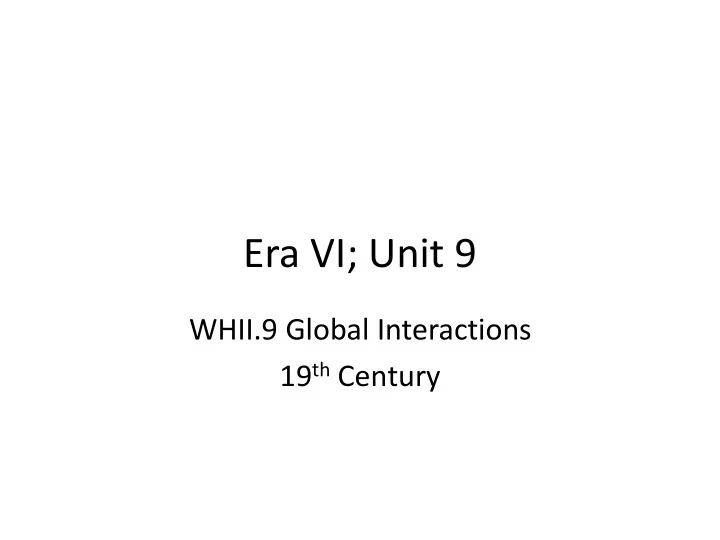

c) Contributions of Toussaint L’Ouverture • Former slave who led the Haitian rebellion against the French • Defeated the armies of three foreign powers (Spain, France, Britain) • Enslaved Haitians rebelled, abolished slavery, and won independence
primary source activity Analyze primary document: Bolívar: 'The Triple Yoke of Ignorance, Tyranny, and Corruption'
Latin American Revolutions; South America
Simón Bolívar • helped win independence from Spain for: – Bolivia – Colombia – Ecuador – Peru – Venezuela
Simón Bolívar • revered in South America • “The Liberator”
d) Contributions of Simón Bolívar • Native resident who led revolutionary efforts • Liberated the northern areas of Latin America
American and French Revolutions= French, Spanish, and Portuguese colonies gained independence
e) Effects of Latin American revolutions • French, Spanish, and Portuguese colonies gained independence • Selected countries gained independence during the 1800s (Mexico, Haiti, Colombia, Venezuela, Brazil)
The student will apply social science skills to understand of the global interactions between 1800 to about 1900 by • locate Latin America √ • explain the causes and effects of the revolutions √ • emphase on the contributions of Toussaint L’Ouverture and Simón Bolívar √ • identify the impact of the American and French Revolutions on Latin America √
The student will apply social science skills to understand of the global interactions between 1800 to about 1900 by • describing the political and social challenges faced by Latin American nations with emphasis on the Monroe Doctrine; • Assessing the European colonization and imperialism on Asia, Africa, the Pacific Islands, and Australia; and • analyzing the relationship between industrialization, imperialism, and nationalism.
The Monroe Doctrine • James Monroe= 5 th US president • 1823 foreign policy warning the countries of Europe against interfering with the affairs of nations in the western hemisphere • Written by Secretary of State John Quincy Adams (son of John; 2 nd president of the US) • most American politicians agreed on an aggressively nationalist and expansionist foreign policy
The Monroe Doctrine
III. Impact of the Monroe Doctrine • The Monroe Doctrine was issued by President James Monroe in 1823. • Latin American nations were acknowledged to be independent. • The United States would regard as a threat to its own peace and safety any attempt by European powers to impose their system on any independent state in the Western Hemisphere. US told Europe to stay away • Newly independent Latin American nations had to assimilate European, African, and Native American cultures into one cohesive society.
For this section, write notes leaving some space for additional info to be added IV Imperialism • Forms – Colonies – Protectorates – Spheres of influence
Colonies • A country or area under the full or partial political control of another country and occupied by settlers from that country
Protectorates On Her Majesty’s Service
Forms of Imperialism • Protectorates: – A state that is controlled and protected by another • Spheres of influence: – A territorial area over which political or economic influence is wielded by one nation
Sphere of Influence
IV Imperialism • Africa and Asia – European domination – European conflicts carried to the colonies – Christian missionary efforts – Spheres of influence in China – Suez Canal – East India Company’s domination of Indian states – America’s opening of Japan to trade (Matthew Perry)
1877 Before The Scramble
1886 The Scramble for Africa
1912 Africa Partitioned
Imperialism…
Suez Canal
Commodore Perry • 1852-4: Matthew Perry left from Norfolk, Virginia, to go to Japan, in command of a squadron that would negotiate a Japanese trade treaty • He was met by representatives of the Tokugawa Shogunate • He refused to follow the limiting trade procedure for Japan • Perry demanded permission to deliver a letter from US President Millard Fillmore which threatened to use force if denied full trade • Japan was intimidated by the US “black ships” • Japan signed the US- Japan Treaty of Peace and Amity
History of Japan https://www.youtube.com/watch?v=WHhPiVRZYYE
IV Imperialism • Pacific Islands – European and American domination – Motivated by a desire to control islands on the way to Asia for refueling and supplies – Colonial powers wanted to control trade and production of raw materials in the islands
Imperialism in the Pacific Islands • European and American domination and control
IV Imperialism • Australia – Became a colony of Britain – Originated as a penal colony for Britain – Australia provided Britain with resources and other benefits
Imperialism in Australia • A place to send prisoners= penal colony
The plight of the Aboriginies
Recommend
More recommend